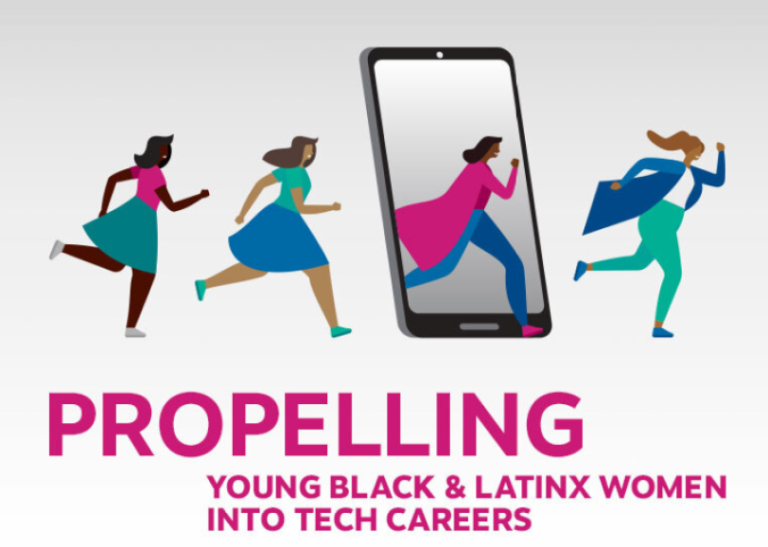“If it wasn’t for NPower, I wouldn’t know what type of help I needed or what that help entailed. It’s very challenging for us veterans to admit to ourselves and others that we need help, but it’s the first step to begin healing, so that we can then conquer our personal and professional goals.
Without NPower’s support, I wouldn’t be here today, and I mean this in a literal sense.
At what I considered to be one of the lowest points in my life, NPower offered me a pathway for a career opportunity in cyber security, but I also received much needed social support and professional development to regain my confidence. With my experience and training, I am now an Information Security Engineer, but more importantly, I am now in charge of my own story.”
Sara D – NPower Graduate
Building Inclusive Economic Mobility Through Trauma Informed Care
NPower received a generous grant from MetLife Foundation to support the integration of Trauma-Informed/Responsive Care in our Tech Fundamentals program.
This support is an investment in multi-generational success for individuals and communities.
Impact Today - Trauma-Informed Program Delivery
NPower’s mission is to equip and empower young adults from underrepresented communities, military-connected individuals, and women of color with access and opportunity to free tech training, industry-recognized tech certifications, and wrap around support including professional development and mentorship, and full-time job placement.
NPower provides a pipeline of dynamic and innovative talent for the nation’s leading employers, creating a more diverse workforce. This helps to close the talent gap within the tech industry while building economic mobility for students so they can achieve multi-generational wealth. Often barriers – systemic, structural, external, and internal – stand in the way between NPower students and high-demand, high-growth careers in technology. Our student-centric approach acknowledges and addresses these barriers with Social Support Managers connecting students to a full-range of services including social service agencies to support their social and emotional well-being and help reduce barriers.
According to the National Council for Mental Wellbeing, 70% of adults in the U.S. (223.4 million people) experience some type of traumatic event at least once in their lives. At NPower, implementing a strong framework around trauma-informed support was a priority to ensure the success of our students. In March 2020, NPower’s National Instructor’s Institute integrated a trauma-informed approach to technical instruction, including trauma-sensitive techniques for classroom engagement. This approach recognizes that interpersonal and systemic traumatic experiences may have an impact on academic, professional, personal, and social-emotional well-being. An intentional and focused effort positioned NPower to create an environment that fosters resiliency through healing and post-traumatic growth. Leaning into the key principles of trauma-informed care: physical/emotional safety, trustworthiness, choice, collaboration (cultural competency & humility), and empowerment promote a sense of safety and security for individuals who have experienced trauma.
With each individual having a unique set of lived experiences, we prioritize students as being experts of their own experiences and remain supportive of the whole individual by meeting them where they are at.
Examples of the changes since NPower implemented this framework:
- Organization-wide and department-specific trainings
- Comprehensive review of program policies, standards & procedures, and best practices for trauma-informed alignment
- Post-program surveys with graduates to assess trauma-informed delivery (e.g., I feel empowered to achieve success and am confident to take the next steps in my career. (Empowerment))
Future Success – A Trauma-Responsive Approach
The evolution of the trauma-informed approach happens when the focus moves away from awareness of the impacts of trauma to providing support for students who have experienced trauma. When this happens, all aspects of an organization’s programming, environment, language, and values, and staff are aligned to better serve students.
While we have begun this transition to a trauma-responsive program delivery, we will continue to deepen and sustain our implementation.
Elements that will be implemented to build capacity to enhance the program delivery approach include:
- In-depth trainings of trauma-responsive delivery
- Standardization of Social Support Managers’ toolkits with resources and specialized trauma, grief, and resilience trainings
- Consultancy to better understand the impact of the student experience
- Equipping volunteers to use trauma-informed principles during volunteer engagements
Our graduates are resilient. We see this epitomized through their grit, perseverance, emotional awareness, determination, confidence, problem-solving, and resourcefulness.
Our graduates have overcome traumatic experiences related to homelessness, domestic violence, negative college experiences, and military combat that are now thriving in high-quality tech careers. The intentional shift to trauma-informed care and a trauma-responsive program delivery has been a critical component in ensuring students from historically underrepresented and underresourced communities have access to supports that help them thrive in instructional environments and foster high classroom engagement.
With a supportive network, the trauma they experienced fuels post traumatic growth, hunger, and determination to create change in their own lives and their communities.




